WS2512 Organizational Practice: Reflective Report on Social Work
VerifiedAdded on 2023/04/24
|12
|2431
|241
Report
AI Summary
This report, a statement of organizational learning, delves into the complexities of organizational practice within the context of social work, specifically focusing on the WS2512 course. It begins by defining human service organizations (HSOs) and their role in societal welfare, highlighting the interactions between social workers and managers. The report identifies key elements of organizational practice, such as professional values, ethics, and cultural competency, which are crucial for social workers. It then addresses the issues, dilemmas, and challenges faced by social workers and managers, including the struggle for autonomy and the impact of management practices. The importance of organizational literacy and environment for HSO workers is emphasized, especially the role of transformative leadership in motivating employees. The report concludes by summarizing the challenges faced by social workers and the need for continuous knowledge development to improve practice and strengthen their positions within organizations.
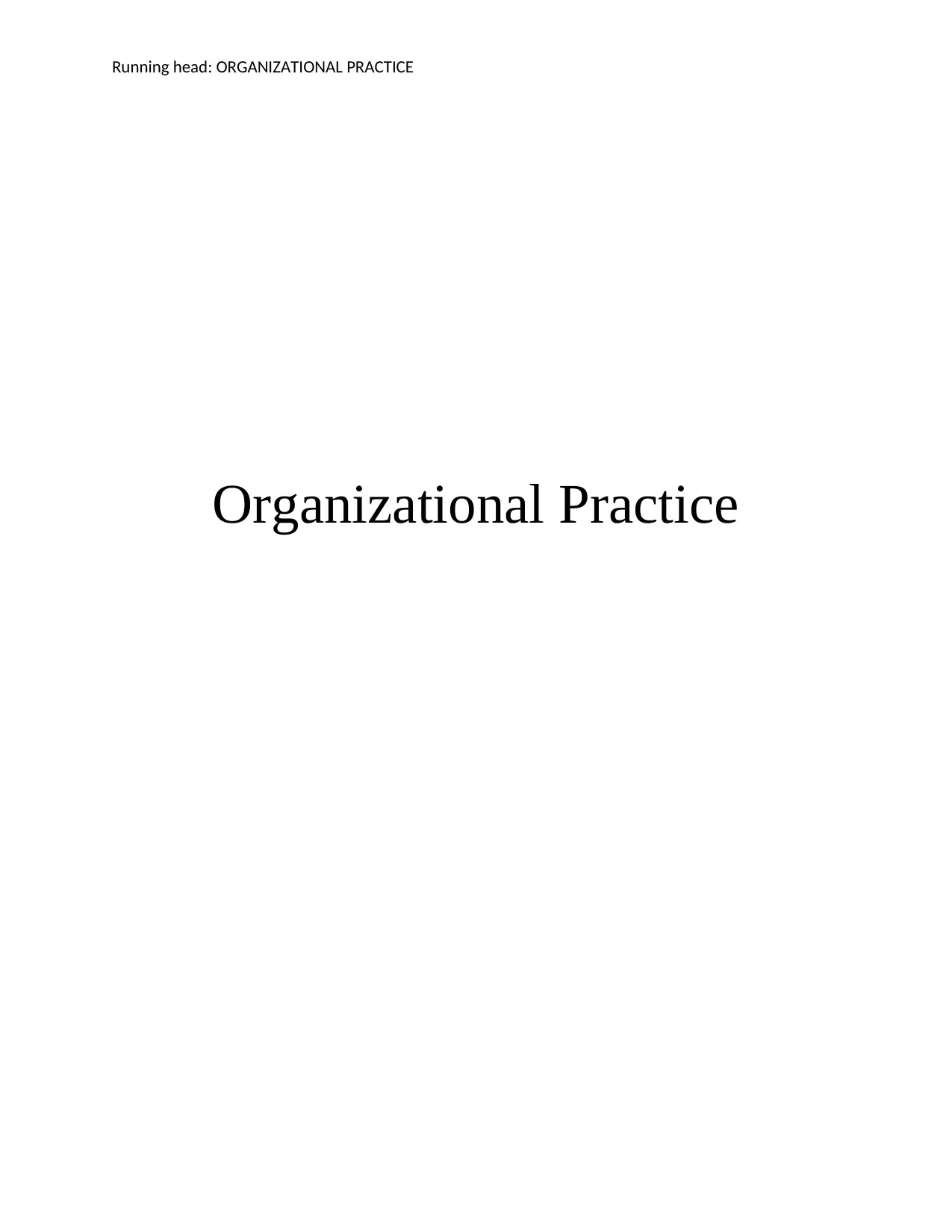
Running head: ORGANIZATIONAL PRACTICE
Organizational Practice
Organizational Practice
Paraphrase This Document
Need a fresh take? Get an instant paraphrase of this document with our AI Paraphraser
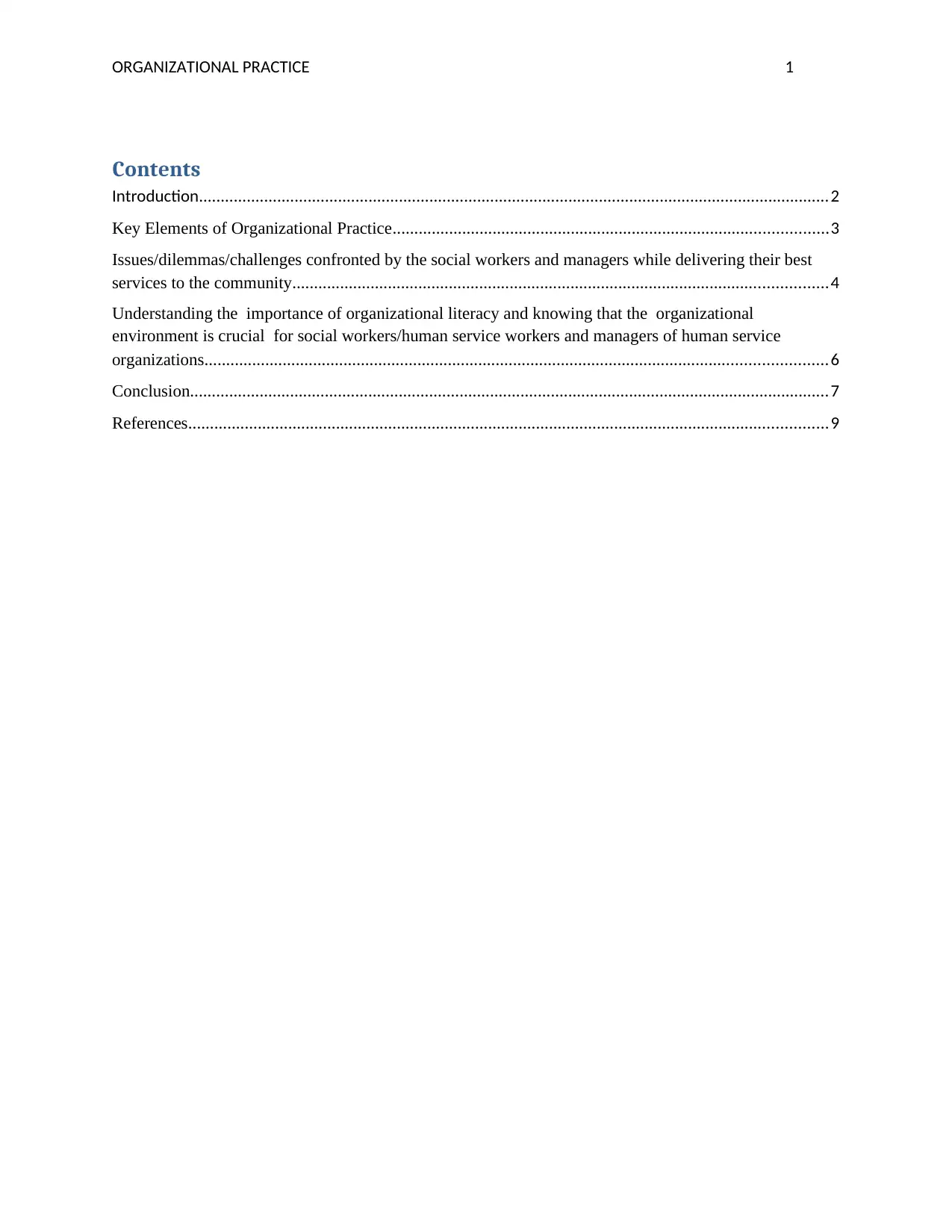
ORGANIZATIONAL PRACTICE 1
Contents
Introduction.................................................................................................................................................2
Key Elements of Organizational Practice....................................................................................................3
Issues/dilemmas/challenges confronted by the social workers and managers while delivering their best
services to the community...........................................................................................................................4
Understanding the importance of organizational literacy and knowing that the organizational
environment is crucial for social workers/human service workers and managers of human service
organizations...............................................................................................................................................6
Conclusion...................................................................................................................................................7
References...................................................................................................................................................9
Contents
Introduction.................................................................................................................................................2
Key Elements of Organizational Practice....................................................................................................3
Issues/dilemmas/challenges confronted by the social workers and managers while delivering their best
services to the community...........................................................................................................................4
Understanding the importance of organizational literacy and knowing that the organizational
environment is crucial for social workers/human service workers and managers of human service
organizations...............................................................................................................................................6
Conclusion...................................................................................................................................................7
References...................................................................................................................................................9
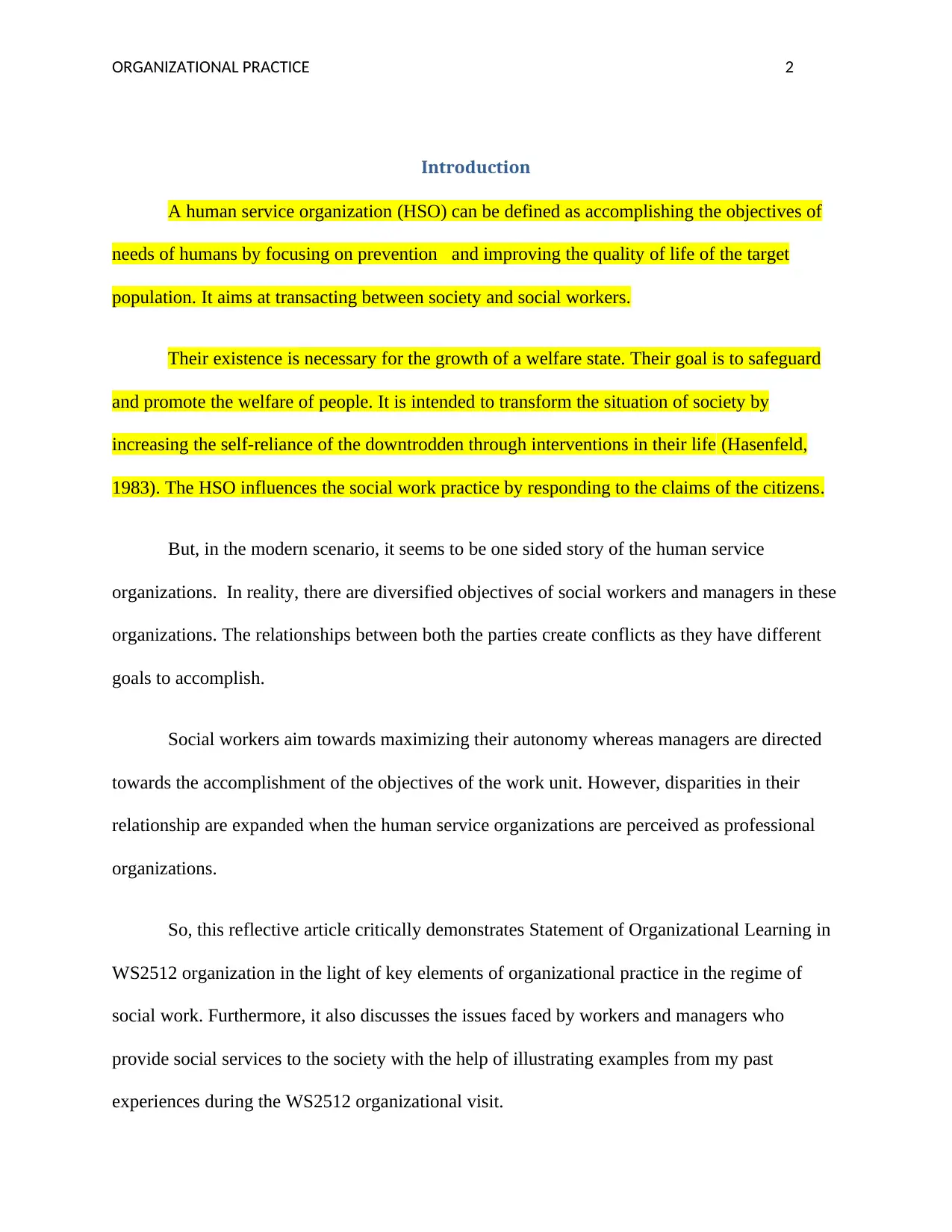
ORGANIZATIONAL PRACTICE 2
Introduction
A human service organization (HSO) can be defined as accomplishing the objectives of
needs of humans by focusing on prevention and improving the quality of life of the target
population. It aims at transacting between society and social workers.
Their existence is necessary for the growth of a welfare state. Their goal is to safeguard
and promote the welfare of people. It is intended to transform the situation of society by
increasing the self-reliance of the downtrodden through interventions in their life (Hasenfeld,
1983). The HSO influences the social work practice by responding to the claims of the citizens.
But, in the modern scenario, it seems to be one sided story of the human service
organizations. In reality, there are diversified objectives of social workers and managers in these
organizations. The relationships between both the parties create conflicts as they have different
goals to accomplish.
Social workers aim towards maximizing their autonomy whereas managers are directed
towards the accomplishment of the objectives of the work unit. However, disparities in their
relationship are expanded when the human service organizations are perceived as professional
organizations.
So, this reflective article critically demonstrates Statement of Organizational Learning in
WS2512 organization in the light of key elements of organizational practice in the regime of
social work. Furthermore, it also discusses the issues faced by workers and managers who
provide social services to the society with the help of illustrating examples from my past
experiences during the WS2512 organizational visit.
Introduction
A human service organization (HSO) can be defined as accomplishing the objectives of
needs of humans by focusing on prevention and improving the quality of life of the target
population. It aims at transacting between society and social workers.
Their existence is necessary for the growth of a welfare state. Their goal is to safeguard
and promote the welfare of people. It is intended to transform the situation of society by
increasing the self-reliance of the downtrodden through interventions in their life (Hasenfeld,
1983). The HSO influences the social work practice by responding to the claims of the citizens.
But, in the modern scenario, it seems to be one sided story of the human service
organizations. In reality, there are diversified objectives of social workers and managers in these
organizations. The relationships between both the parties create conflicts as they have different
goals to accomplish.
Social workers aim towards maximizing their autonomy whereas managers are directed
towards the accomplishment of the objectives of the work unit. However, disparities in their
relationship are expanded when the human service organizations are perceived as professional
organizations.
So, this reflective article critically demonstrates Statement of Organizational Learning in
WS2512 organization in the light of key elements of organizational practice in the regime of
social work. Furthermore, it also discusses the issues faced by workers and managers who
provide social services to the society with the help of illustrating examples from my past
experiences during the WS2512 organizational visit.
⊘ This is a preview!⊘
Do you want full access?
Subscribe today to unlock all pages.

Trusted by 1+ million students worldwide
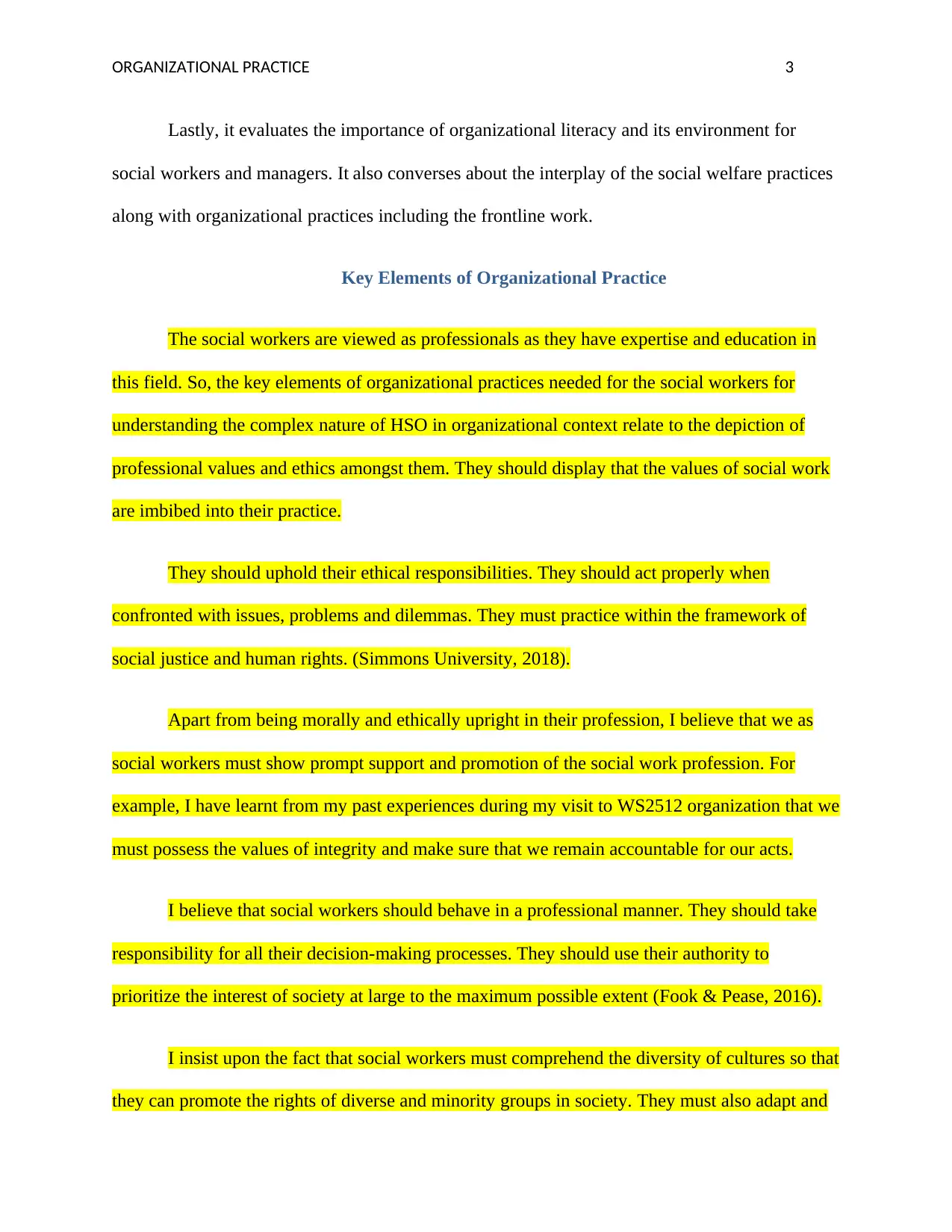
ORGANIZATIONAL PRACTICE 3
Lastly, it evaluates the importance of organizational literacy and its environment for
social workers and managers. It also converses about the interplay of the social welfare practices
along with organizational practices including the frontline work.
Key Elements of Organizational Practice
The social workers are viewed as professionals as they have expertise and education in
this field. So, the key elements of organizational practices needed for the social workers for
understanding the complex nature of HSO in organizational context relate to the depiction of
professional values and ethics amongst them. They should display that the values of social work
are imbibed into their practice.
They should uphold their ethical responsibilities. They should act properly when
confronted with issues, problems and dilemmas. They must practice within the framework of
social justice and human rights. (Simmons University, 2018).
Apart from being morally and ethically upright in their profession, I believe that we as
social workers must show prompt support and promotion of the social work profession. For
example, I have learnt from my past experiences during my visit to WS2512 organization that we
must possess the values of integrity and make sure that we remain accountable for our acts.
I believe that social workers should behave in a professional manner. They should take
responsibility for all their decision-making processes. They should use their authority to
prioritize the interest of society at large to the maximum possible extent (Fook & Pease, 2016).
I insist upon the fact that social workers must comprehend the diversity of cultures so that
they can promote the rights of diverse and minority groups in society. They must also adapt and
Lastly, it evaluates the importance of organizational literacy and its environment for
social workers and managers. It also converses about the interplay of the social welfare practices
along with organizational practices including the frontline work.
Key Elements of Organizational Practice
The social workers are viewed as professionals as they have expertise and education in
this field. So, the key elements of organizational practices needed for the social workers for
understanding the complex nature of HSO in organizational context relate to the depiction of
professional values and ethics amongst them. They should display that the values of social work
are imbibed into their practice.
They should uphold their ethical responsibilities. They should act properly when
confronted with issues, problems and dilemmas. They must practice within the framework of
social justice and human rights. (Simmons University, 2018).
Apart from being morally and ethically upright in their profession, I believe that we as
social workers must show prompt support and promotion of the social work profession. For
example, I have learnt from my past experiences during my visit to WS2512 organization that we
must possess the values of integrity and make sure that we remain accountable for our acts.
I believe that social workers should behave in a professional manner. They should take
responsibility for all their decision-making processes. They should use their authority to
prioritize the interest of society at large to the maximum possible extent (Fook & Pease, 2016).
I insist upon the fact that social workers must comprehend the diversity of cultures so that
they can promote the rights of diverse and minority groups in society. They must also adapt and
Paraphrase This Document
Need a fresh take? Get an instant paraphrase of this document with our AI Paraphraser
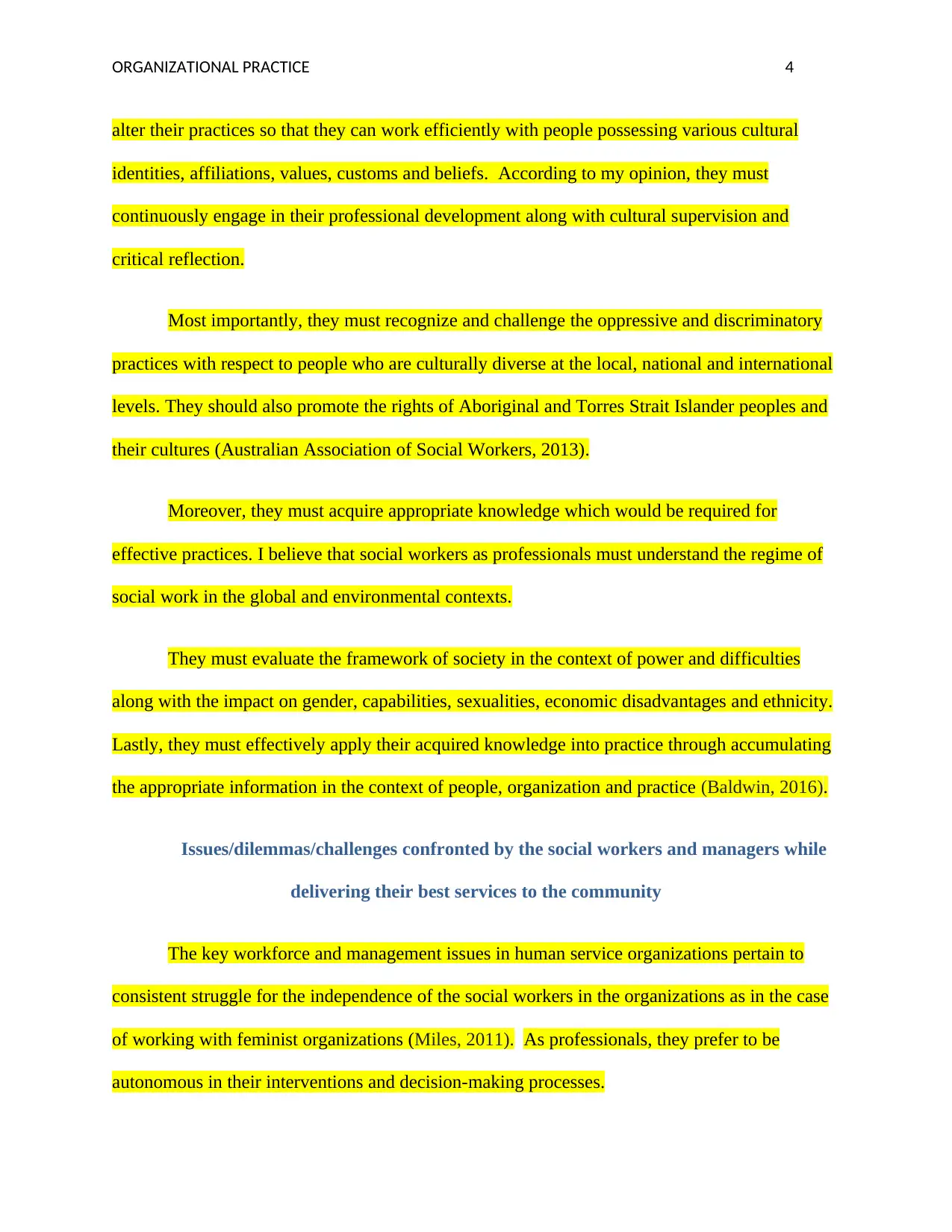
ORGANIZATIONAL PRACTICE 4
alter their practices so that they can work efficiently with people possessing various cultural
identities, affiliations, values, customs and beliefs. According to my opinion, they must
continuously engage in their professional development along with cultural supervision and
critical reflection.
Most importantly, they must recognize and challenge the oppressive and discriminatory
practices with respect to people who are culturally diverse at the local, national and international
levels. They should also promote the rights of Aboriginal and Torres Strait Islander peoples and
their cultures (Australian Association of Social Workers, 2013).
Moreover, they must acquire appropriate knowledge which would be required for
effective practices. I believe that social workers as professionals must understand the regime of
social work in the global and environmental contexts.
They must evaluate the framework of society in the context of power and difficulties
along with the impact on gender, capabilities, sexualities, economic disadvantages and ethnicity.
Lastly, they must effectively apply their acquired knowledge into practice through accumulating
the appropriate information in the context of people, organization and practice (Baldwin, 2016).
Issues/dilemmas/challenges confronted by the social workers and managers while
delivering their best services to the community
The key workforce and management issues in human service organizations pertain to
consistent struggle for the independence of the social workers in the organizations as in the case
of working with feminist organizations (Miles, 2011). As professionals, they prefer to be
autonomous in their interventions and decision-making processes.
alter their practices so that they can work efficiently with people possessing various cultural
identities, affiliations, values, customs and beliefs. According to my opinion, they must
continuously engage in their professional development along with cultural supervision and
critical reflection.
Most importantly, they must recognize and challenge the oppressive and discriminatory
practices with respect to people who are culturally diverse at the local, national and international
levels. They should also promote the rights of Aboriginal and Torres Strait Islander peoples and
their cultures (Australian Association of Social Workers, 2013).
Moreover, they must acquire appropriate knowledge which would be required for
effective practices. I believe that social workers as professionals must understand the regime of
social work in the global and environmental contexts.
They must evaluate the framework of society in the context of power and difficulties
along with the impact on gender, capabilities, sexualities, economic disadvantages and ethnicity.
Lastly, they must effectively apply their acquired knowledge into practice through accumulating
the appropriate information in the context of people, organization and practice (Baldwin, 2016).
Issues/dilemmas/challenges confronted by the social workers and managers while
delivering their best services to the community
The key workforce and management issues in human service organizations pertain to
consistent struggle for the independence of the social workers in the organizations as in the case
of working with feminist organizations (Miles, 2011). As professionals, they prefer to be
autonomous in their interventions and decision-making processes.
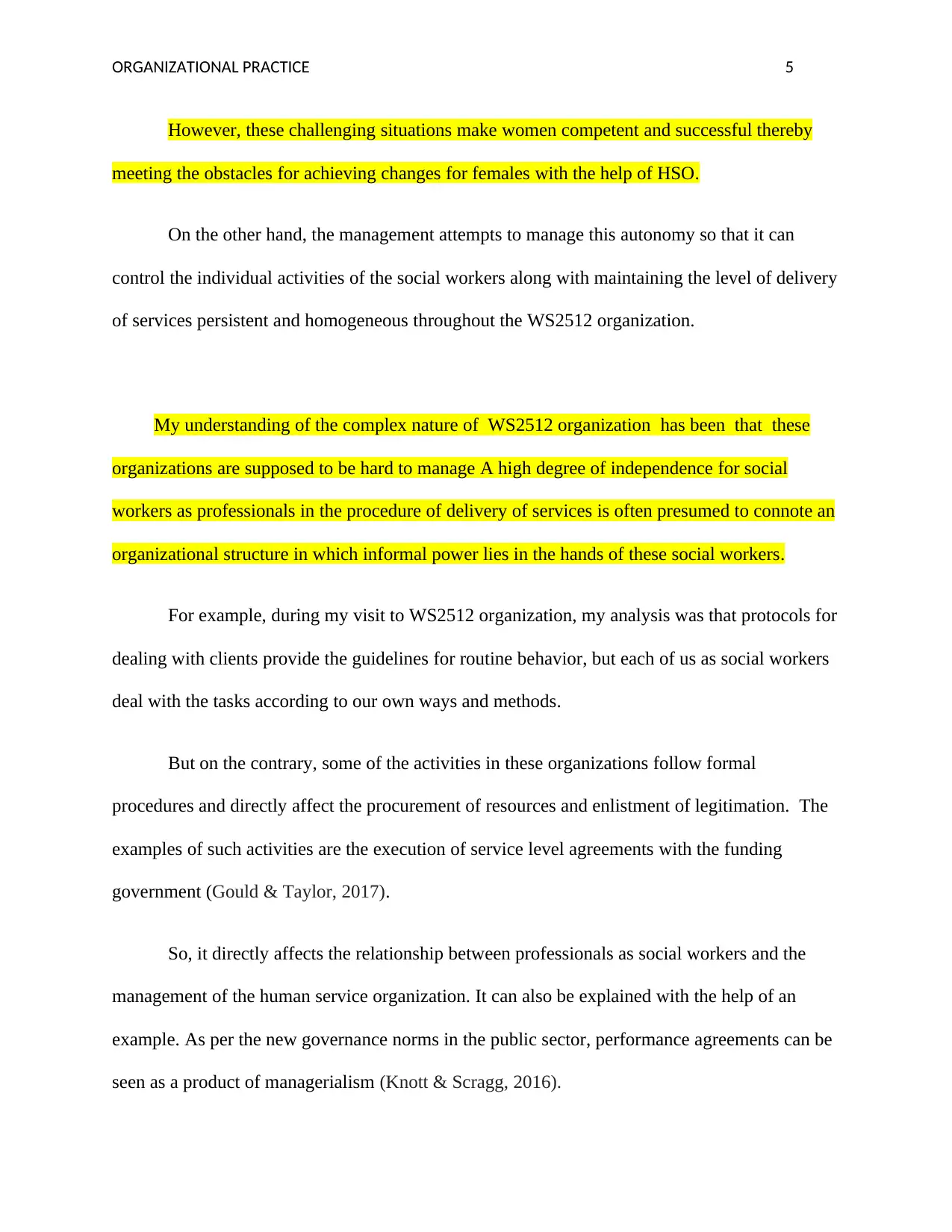
ORGANIZATIONAL PRACTICE 5
However, these challenging situations make women competent and successful thereby
meeting the obstacles for achieving changes for females with the help of HSO.
On the other hand, the management attempts to manage this autonomy so that it can
control the individual activities of the social workers along with maintaining the level of delivery
of services persistent and homogeneous throughout the WS2512 organization.
My understanding of the complex nature of WS2512 organization has been that these
organizations are supposed to be hard to manage A high degree of independence for social
workers as professionals in the procedure of delivery of services is often presumed to connote an
organizational structure in which informal power lies in the hands of these social workers.
For example, during my visit to WS2512 organization, my analysis was that protocols for
dealing with clients provide the guidelines for routine behavior, but each of us as social workers
deal with the tasks according to our own ways and methods.
But on the contrary, some of the activities in these organizations follow formal
procedures and directly affect the procurement of resources and enlistment of legitimation. The
examples of such activities are the execution of service level agreements with the funding
government (Gould & Taylor, 2017).
So, it directly affects the relationship between professionals as social workers and the
management of the human service organization. It can also be explained with the help of an
example. As per the new governance norms in the public sector, performance agreements can be
seen as a product of managerialism (Knott & Scragg, 2016).
However, these challenging situations make women competent and successful thereby
meeting the obstacles for achieving changes for females with the help of HSO.
On the other hand, the management attempts to manage this autonomy so that it can
control the individual activities of the social workers along with maintaining the level of delivery
of services persistent and homogeneous throughout the WS2512 organization.
My understanding of the complex nature of WS2512 organization has been that these
organizations are supposed to be hard to manage A high degree of independence for social
workers as professionals in the procedure of delivery of services is often presumed to connote an
organizational structure in which informal power lies in the hands of these social workers.
For example, during my visit to WS2512 organization, my analysis was that protocols for
dealing with clients provide the guidelines for routine behavior, but each of us as social workers
deal with the tasks according to our own ways and methods.
But on the contrary, some of the activities in these organizations follow formal
procedures and directly affect the procurement of resources and enlistment of legitimation. The
examples of such activities are the execution of service level agreements with the funding
government (Gould & Taylor, 2017).
So, it directly affects the relationship between professionals as social workers and the
management of the human service organization. It can also be explained with the help of an
example. As per the new governance norms in the public sector, performance agreements can be
seen as a product of managerialism (Knott & Scragg, 2016).
⊘ This is a preview!⊘
Do you want full access?
Subscribe today to unlock all pages.

Trusted by 1+ million students worldwide
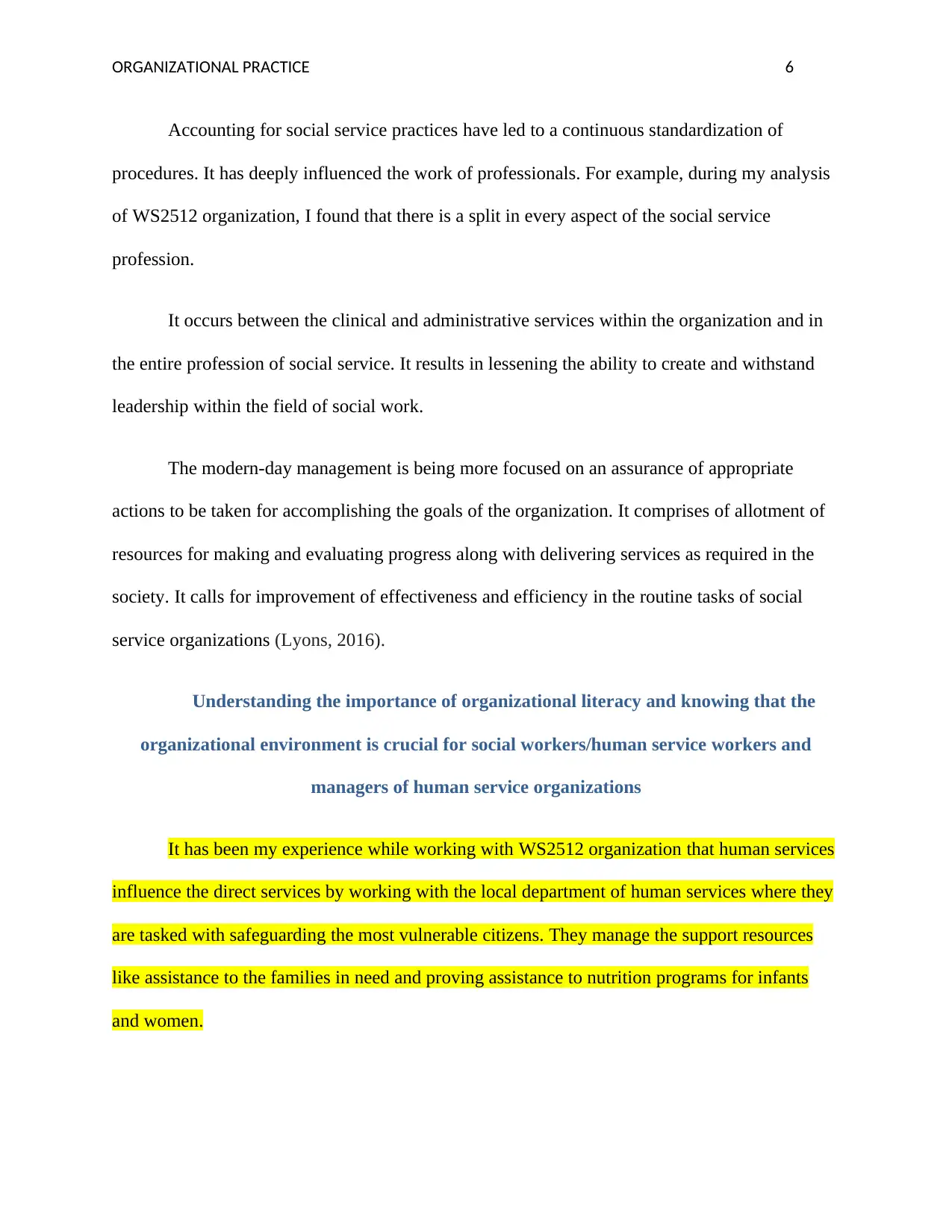
ORGANIZATIONAL PRACTICE 6
Accounting for social service practices have led to a continuous standardization of
procedures. It has deeply influenced the work of professionals. For example, during my analysis
of WS2512 organization, I found that there is a split in every aspect of the social service
profession.
It occurs between the clinical and administrative services within the organization and in
the entire profession of social service. It results in lessening the ability to create and withstand
leadership within the field of social work.
The modern-day management is being more focused on an assurance of appropriate
actions to be taken for accomplishing the goals of the organization. It comprises of allotment of
resources for making and evaluating progress along with delivering services as required in the
society. It calls for improvement of effectiveness and efficiency in the routine tasks of social
service organizations (Lyons, 2016).
Understanding the importance of organizational literacy and knowing that the
organizational environment is crucial for social workers/human service workers and
managers of human service organizations
It has been my experience while working with WS2512 organization that human services
influence the direct services by working with the local department of human services where they
are tasked with safeguarding the most vulnerable citizens. They manage the support resources
like assistance to the families in need and proving assistance to nutrition programs for infants
and women.
Accounting for social service practices have led to a continuous standardization of
procedures. It has deeply influenced the work of professionals. For example, during my analysis
of WS2512 organization, I found that there is a split in every aspect of the social service
profession.
It occurs between the clinical and administrative services within the organization and in
the entire profession of social service. It results in lessening the ability to create and withstand
leadership within the field of social work.
The modern-day management is being more focused on an assurance of appropriate
actions to be taken for accomplishing the goals of the organization. It comprises of allotment of
resources for making and evaluating progress along with delivering services as required in the
society. It calls for improvement of effectiveness and efficiency in the routine tasks of social
service organizations (Lyons, 2016).
Understanding the importance of organizational literacy and knowing that the
organizational environment is crucial for social workers/human service workers and
managers of human service organizations
It has been my experience while working with WS2512 organization that human services
influence the direct services by working with the local department of human services where they
are tasked with safeguarding the most vulnerable citizens. They manage the support resources
like assistance to the families in need and proving assistance to nutrition programs for infants
and women.
Paraphrase This Document
Need a fresh take? Get an instant paraphrase of this document with our AI Paraphraser
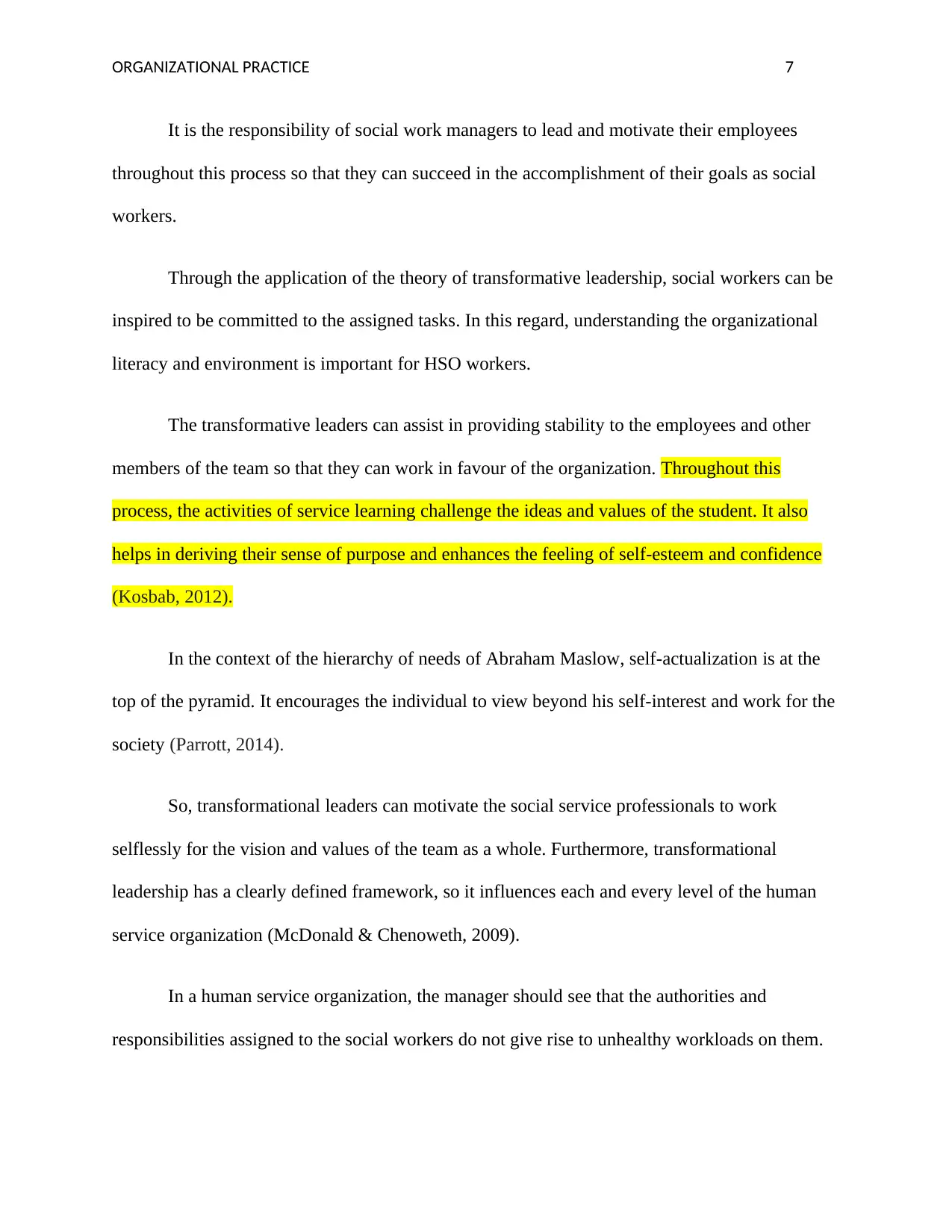
ORGANIZATIONAL PRACTICE 7
It is the responsibility of social work managers to lead and motivate their employees
throughout this process so that they can succeed in the accomplishment of their goals as social
workers.
Through the application of the theory of transformative leadership, social workers can be
inspired to be committed to the assigned tasks. In this regard, understanding the organizational
literacy and environment is important for HSO workers.
The transformative leaders can assist in providing stability to the employees and other
members of the team so that they can work in favour of the organization. Throughout this
process, the activities of service learning challenge the ideas and values of the student. It also
helps in deriving their sense of purpose and enhances the feeling of self-esteem and confidence
(Kosbab, 2012).
In the context of the hierarchy of needs of Abraham Maslow, self-actualization is at the
top of the pyramid. It encourages the individual to view beyond his self-interest and work for the
society (Parrott, 2014).
So, transformational leaders can motivate the social service professionals to work
selflessly for the vision and values of the team as a whole. Furthermore, transformational
leadership has a clearly defined framework, so it influences each and every level of the human
service organization (McDonald & Chenoweth, 2009).
In a human service organization, the manager should see that the authorities and
responsibilities assigned to the social workers do not give rise to unhealthy workloads on them.
It is the responsibility of social work managers to lead and motivate their employees
throughout this process so that they can succeed in the accomplishment of their goals as social
workers.
Through the application of the theory of transformative leadership, social workers can be
inspired to be committed to the assigned tasks. In this regard, understanding the organizational
literacy and environment is important for HSO workers.
The transformative leaders can assist in providing stability to the employees and other
members of the team so that they can work in favour of the organization. Throughout this
process, the activities of service learning challenge the ideas and values of the student. It also
helps in deriving their sense of purpose and enhances the feeling of self-esteem and confidence
(Kosbab, 2012).
In the context of the hierarchy of needs of Abraham Maslow, self-actualization is at the
top of the pyramid. It encourages the individual to view beyond his self-interest and work for the
society (Parrott, 2014).
So, transformational leaders can motivate the social service professionals to work
selflessly for the vision and values of the team as a whole. Furthermore, transformational
leadership has a clearly defined framework, so it influences each and every level of the human
service organization (McDonald & Chenoweth, 2009).
In a human service organization, the manager should see that the authorities and
responsibilities assigned to the social workers do not give rise to unhealthy workloads on them.
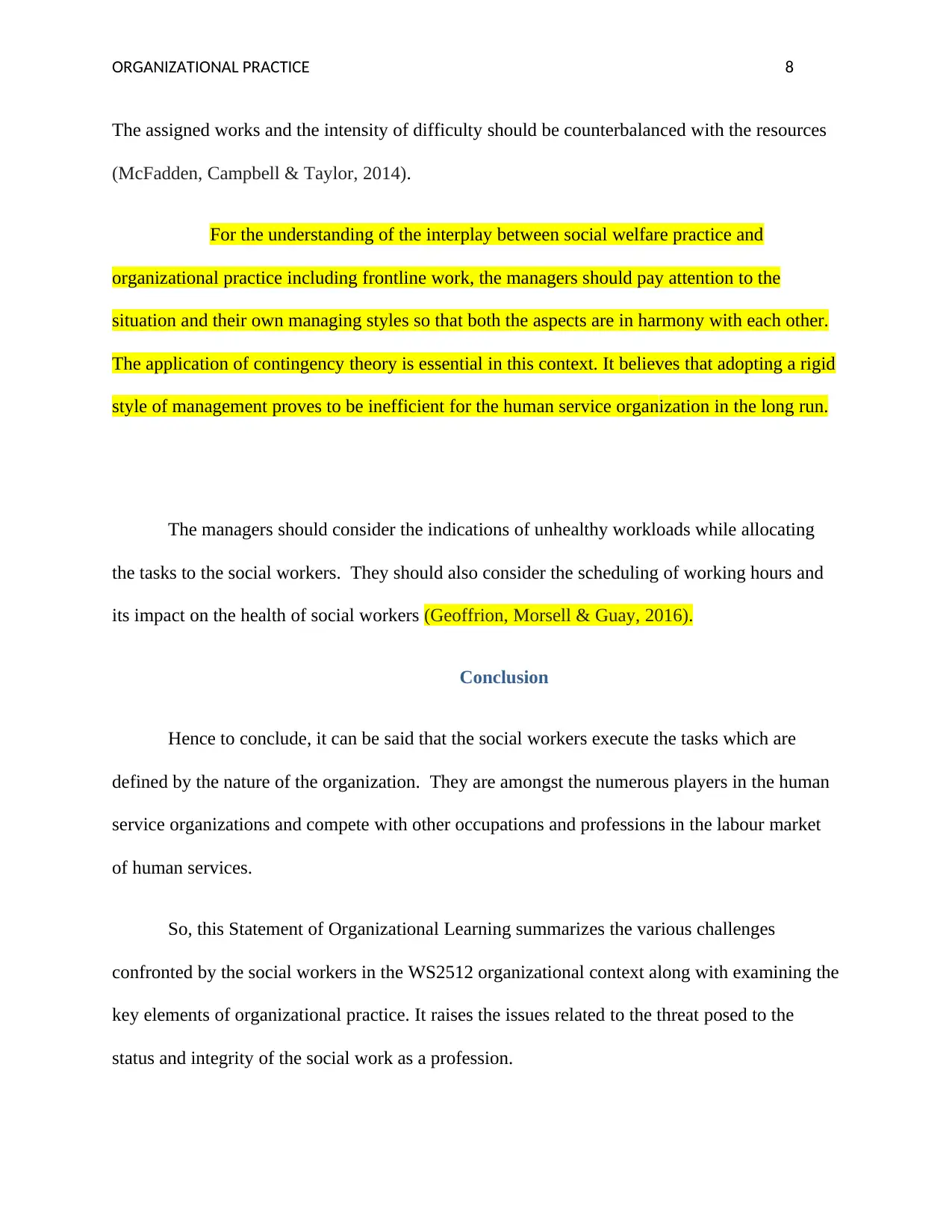
ORGANIZATIONAL PRACTICE 8
The assigned works and the intensity of difficulty should be counterbalanced with the resources
(McFadden, Campbell & Taylor, 2014).
For the understanding of the interplay between social welfare practice and
organizational practice including frontline work, the managers should pay attention to the
situation and their own managing styles so that both the aspects are in harmony with each other.
The application of contingency theory is essential in this context. It believes that adopting a rigid
style of management proves to be inefficient for the human service organization in the long run.
The managers should consider the indications of unhealthy workloads while allocating
the tasks to the social workers. They should also consider the scheduling of working hours and
its impact on the health of social workers (Geoffrion, Morsell & Guay, 2016).
Conclusion
Hence to conclude, it can be said that the social workers execute the tasks which are
defined by the nature of the organization. They are amongst the numerous players in the human
service organizations and compete with other occupations and professions in the labour market
of human services.
So, this Statement of Organizational Learning summarizes the various challenges
confronted by the social workers in the WS2512 organizational context along with examining the
key elements of organizational practice. It raises the issues related to the threat posed to the
status and integrity of the social work as a profession.
The assigned works and the intensity of difficulty should be counterbalanced with the resources
(McFadden, Campbell & Taylor, 2014).
For the understanding of the interplay between social welfare practice and
organizational practice including frontline work, the managers should pay attention to the
situation and their own managing styles so that both the aspects are in harmony with each other.
The application of contingency theory is essential in this context. It believes that adopting a rigid
style of management proves to be inefficient for the human service organization in the long run.
The managers should consider the indications of unhealthy workloads while allocating
the tasks to the social workers. They should also consider the scheduling of working hours and
its impact on the health of social workers (Geoffrion, Morsell & Guay, 2016).
Conclusion
Hence to conclude, it can be said that the social workers execute the tasks which are
defined by the nature of the organization. They are amongst the numerous players in the human
service organizations and compete with other occupations and professions in the labour market
of human services.
So, this Statement of Organizational Learning summarizes the various challenges
confronted by the social workers in the WS2512 organizational context along with examining the
key elements of organizational practice. It raises the issues related to the threat posed to the
status and integrity of the social work as a profession.
⊘ This is a preview!⊘
Do you want full access?
Subscribe today to unlock all pages.

Trusted by 1+ million students worldwide
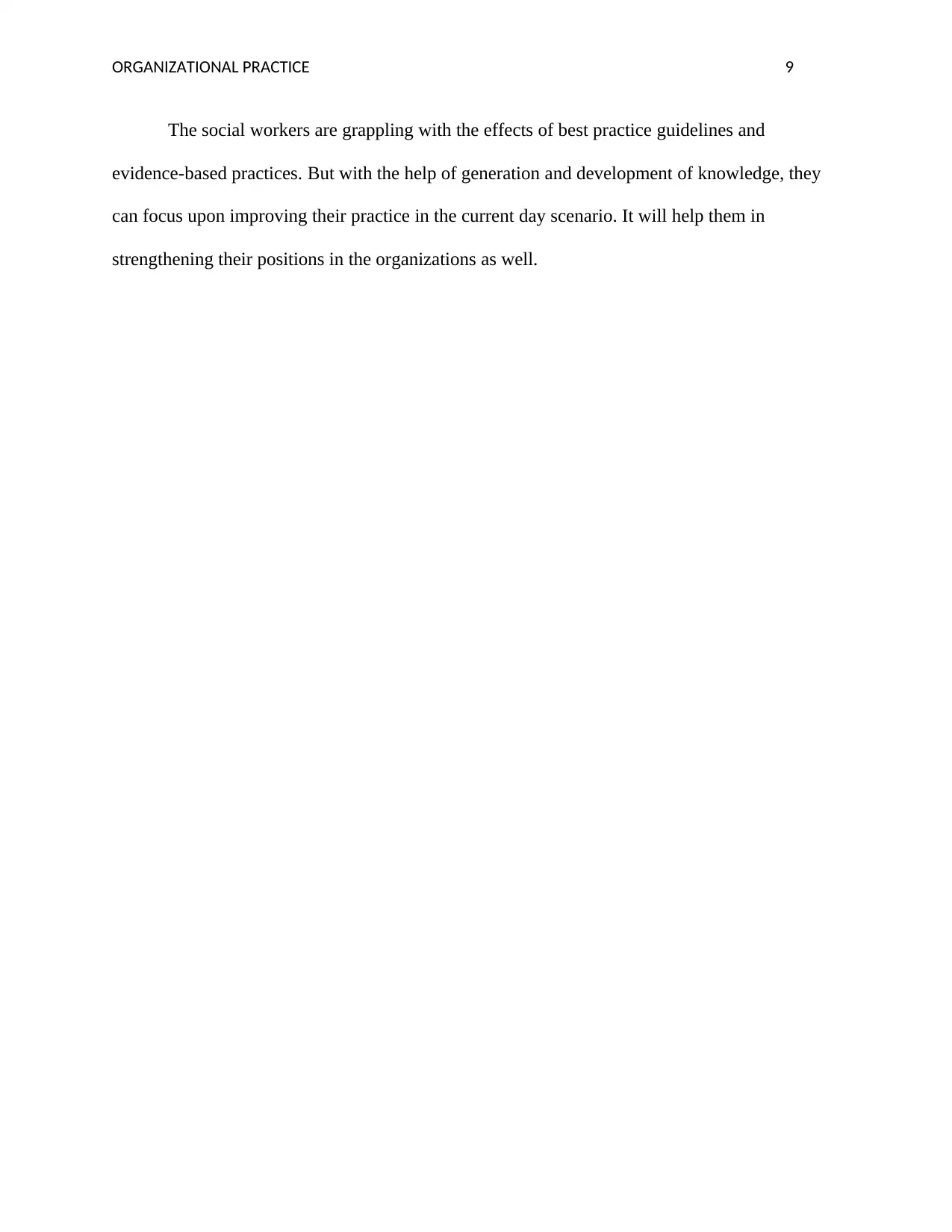
ORGANIZATIONAL PRACTICE 9
The social workers are grappling with the effects of best practice guidelines and
evidence-based practices. But with the help of generation and development of knowledge, they
can focus upon improving their practice in the current day scenario. It will help them in
strengthening their positions in the organizations as well.
The social workers are grappling with the effects of best practice guidelines and
evidence-based practices. But with the help of generation and development of knowledge, they
can focus upon improving their practice in the current day scenario. It will help them in
strengthening their positions in the organizations as well.
Paraphrase This Document
Need a fresh take? Get an instant paraphrase of this document with our AI Paraphraser
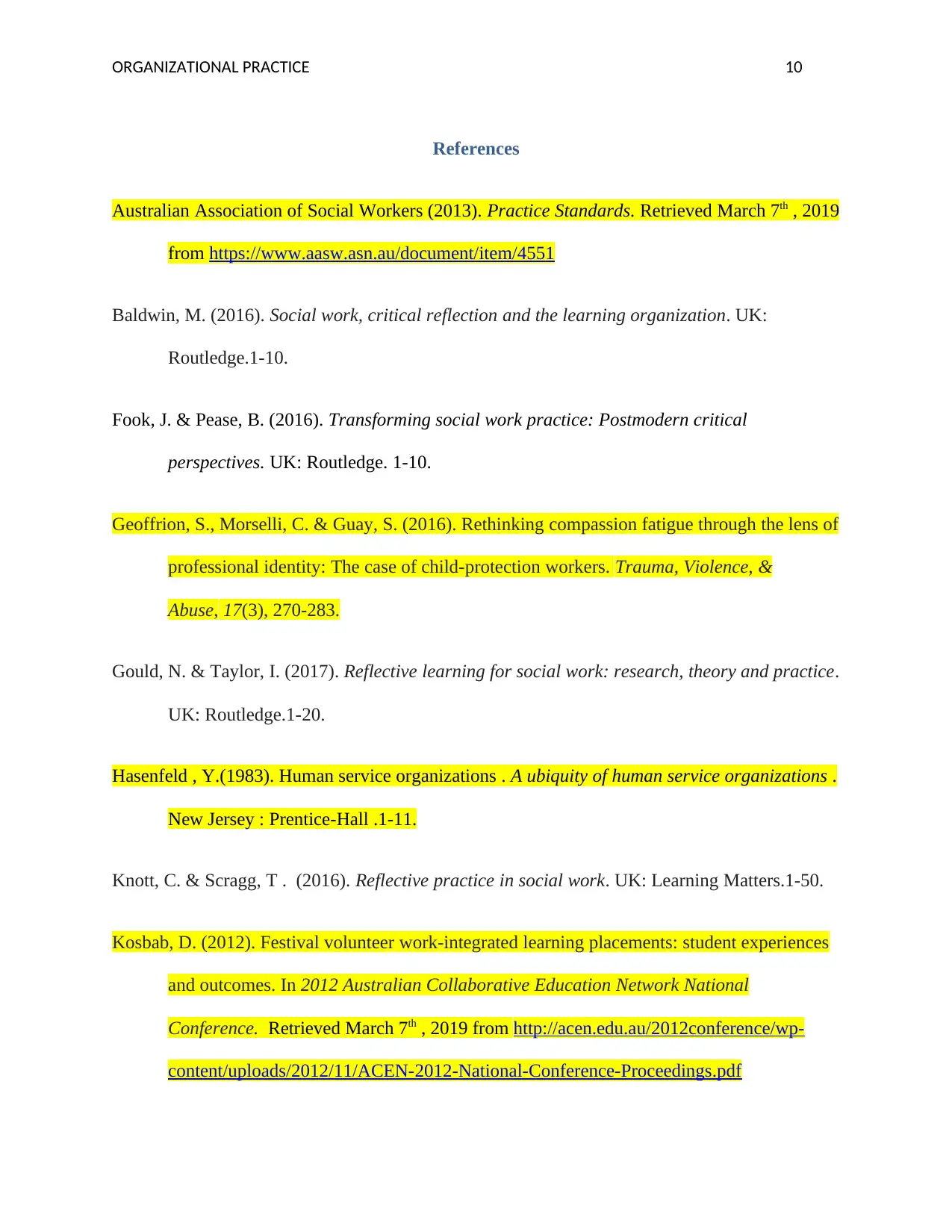
ORGANIZATIONAL PRACTICE 10
References
Australian Association of Social Workers (2013). Practice Standards. Retrieved March 7th , 2019
from https://www.aasw.asn.au/document/item/4551
Baldwin, M. (2016). Social work, critical reflection and the learning organization. UK:
Routledge.1-10.
Fook, J. & Pease, B. (2016). Transforming social work practice: Postmodern critical
perspectives. UK: Routledge. 1-10.
Geoffrion, S., Morselli, C. & Guay, S. (2016). Rethinking compassion fatigue through the lens of
professional identity: The case of child-protection workers. Trauma, Violence, &
Abuse, 17(3), 270-283.
Gould, N. & Taylor, I. (2017). Reflective learning for social work: research, theory and practice.
UK: Routledge.1-20.
Hasenfeld , Y.(1983). Human service organizations . A ubiquity of human service organizations .
New Jersey : Prentice-Hall .1-11.
Knott, C. & Scragg, T . (2016). Reflective practice in social work. UK: Learning Matters.1-50.
Kosbab, D. (2012). Festival volunteer work-integrated learning placements: student experiences
and outcomes. In 2012 Australian Collaborative Education Network National
Conference. Retrieved March 7th , 2019 from http://acen.edu.au/2012conference/wp-
content/uploads/2012/11/ACEN-2012-National-Conference-Proceedings.pdf
References
Australian Association of Social Workers (2013). Practice Standards. Retrieved March 7th , 2019
from https://www.aasw.asn.au/document/item/4551
Baldwin, M. (2016). Social work, critical reflection and the learning organization. UK:
Routledge.1-10.
Fook, J. & Pease, B. (2016). Transforming social work practice: Postmodern critical
perspectives. UK: Routledge. 1-10.
Geoffrion, S., Morselli, C. & Guay, S. (2016). Rethinking compassion fatigue through the lens of
professional identity: The case of child-protection workers. Trauma, Violence, &
Abuse, 17(3), 270-283.
Gould, N. & Taylor, I. (2017). Reflective learning for social work: research, theory and practice.
UK: Routledge.1-20.
Hasenfeld , Y.(1983). Human service organizations . A ubiquity of human service organizations .
New Jersey : Prentice-Hall .1-11.
Knott, C. & Scragg, T . (2016). Reflective practice in social work. UK: Learning Matters.1-50.
Kosbab, D. (2012). Festival volunteer work-integrated learning placements: student experiences
and outcomes. In 2012 Australian Collaborative Education Network National
Conference. Retrieved March 7th , 2019 from http://acen.edu.au/2012conference/wp-
content/uploads/2012/11/ACEN-2012-National-Conference-Proceedings.pdf
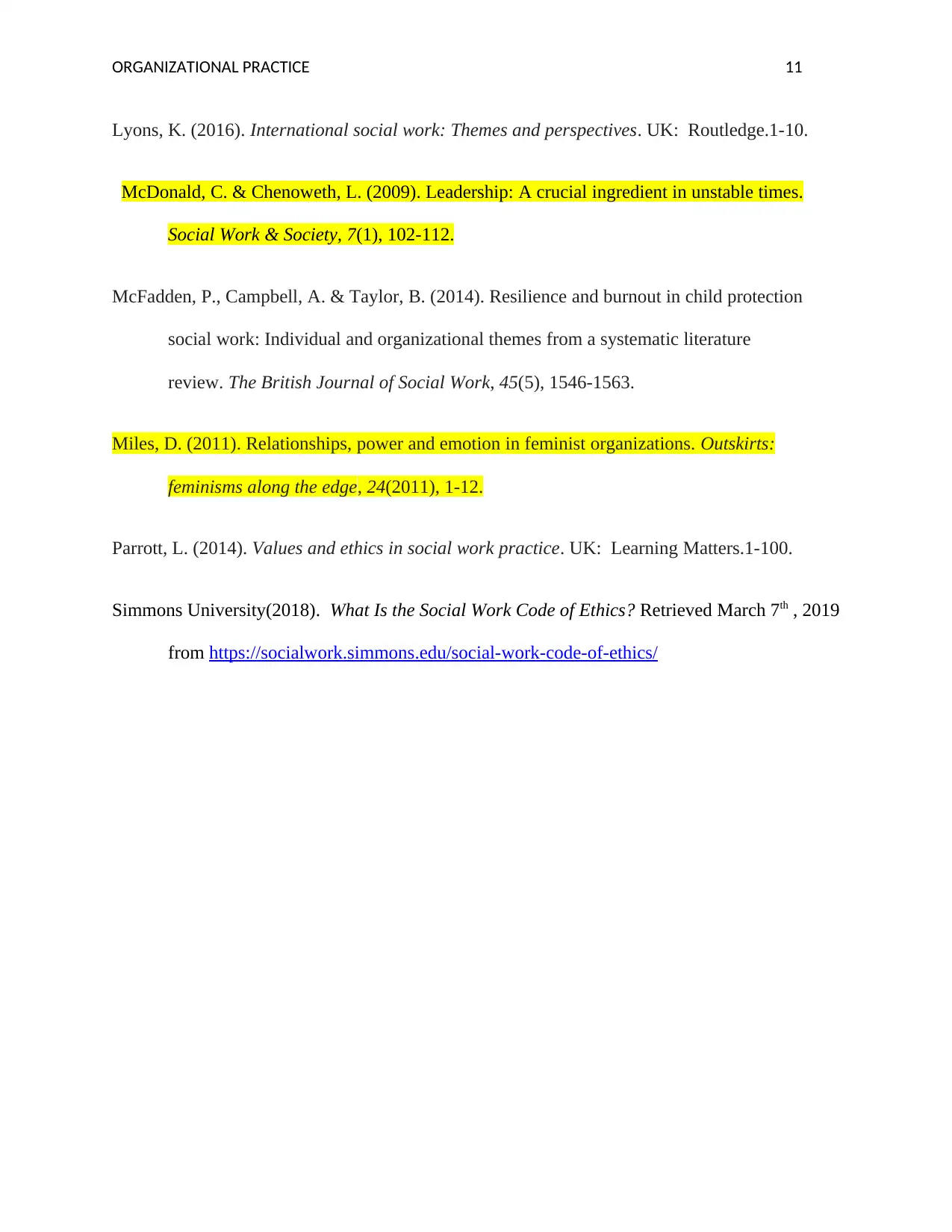
ORGANIZATIONAL PRACTICE 11
Lyons, K. (2016). International social work: Themes and perspectives. UK: Routledge.1-10.
McDonald, C. & Chenoweth, L. (2009). Leadership: A crucial ingredient in unstable times.
Social Work & Society, 7(1), 102-112.
McFadden, P., Campbell, A. & Taylor, B. (2014). Resilience and burnout in child protection
social work: Individual and organizational themes from a systematic literature
review. The British Journal of Social Work, 45(5), 1546-1563.
Miles, D. (2011). Relationships, power and emotion in feminist organizations. Outskirts:
feminisms along the edge, 24(2011), 1-12.
Parrott, L. (2014). Values and ethics in social work practice. UK: Learning Matters.1-100.
Simmons University(2018). What Is the Social Work Code of Ethics? Retrieved March 7th , 2019
from https://socialwork.simmons.edu/social-work-code-of-ethics/
Lyons, K. (2016). International social work: Themes and perspectives. UK: Routledge.1-10.
McDonald, C. & Chenoweth, L. (2009). Leadership: A crucial ingredient in unstable times.
Social Work & Society, 7(1), 102-112.
McFadden, P., Campbell, A. & Taylor, B. (2014). Resilience and burnout in child protection
social work: Individual and organizational themes from a systematic literature
review. The British Journal of Social Work, 45(5), 1546-1563.
Miles, D. (2011). Relationships, power and emotion in feminist organizations. Outskirts:
feminisms along the edge, 24(2011), 1-12.
Parrott, L. (2014). Values and ethics in social work practice. UK: Learning Matters.1-100.
Simmons University(2018). What Is the Social Work Code of Ethics? Retrieved March 7th , 2019
from https://socialwork.simmons.edu/social-work-code-of-ethics/
⊘ This is a preview!⊘
Do you want full access?
Subscribe today to unlock all pages.

Trusted by 1+ million students worldwide
1 out of 12
Related Documents
Your All-in-One AI-Powered Toolkit for Academic Success.
+13062052269
info@desklib.com
Available 24*7 on WhatsApp / Email
![[object Object]](/_next/static/media/star-bottom.7253800d.svg)
Unlock your academic potential
Copyright © 2020–2026 A2Z Services. All Rights Reserved. Developed and managed by ZUCOL.





